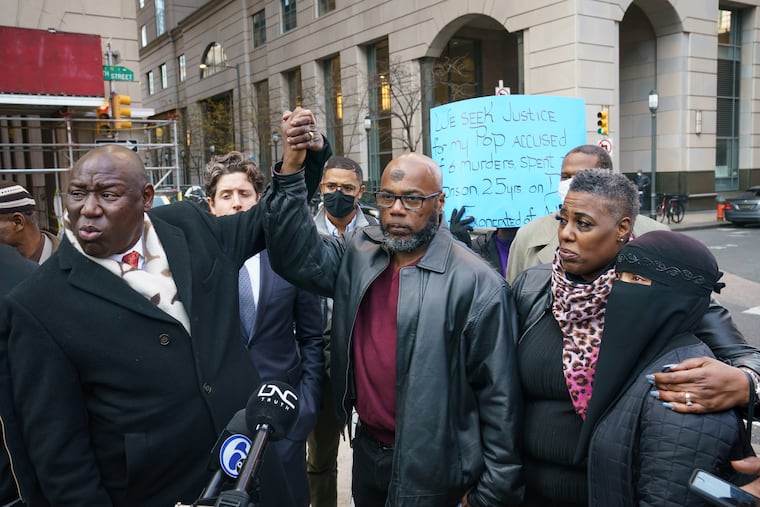After 25 years on Pennsylvania death row, an exonerated man was fatally shot at a funeral
Christopher Williams left more than 25 years on death row "a champion for justice," friends and family said. His fatal shooting at a funeral Friday remains under investigation.

When Christopher Williams came home from prison in February 2021, he was clutching a file folder containing two sheets of paper: two signed execution warrants bearing his name.
Williams had served nearly three decades in prison, including 25 years on Pennsylvania death row, before being exonerated of four murders and freed.
But Friday afternoon he was fatally shot while attending a funeral in North Philadelphia.
Williams, 62, who had also been acquitted of two more murders — all involving the same jailhouse informant — had long held a sense that, just by surviving, he was defying the odds.
» READ MORE: A brutal 1989 triple murder, an eager informant, hidden evidence -- and, now, exoneration
“Never in the history of the Pennsylvania judicial system has someone been charged with six murders, acquitted of two and now exonerated of four,” he said when released.
No arrests have been made in Friday’s shooting. Family and friends of Williams, a father of six children, said they were shocked by his death. Williams had been driving in a funeral procession for another formerly incarcerated man, Tyree Little, friends said. After stepping out of his car at Mount Peace Cemetery, near the 3000 block of Lehigh Avenue, Williams was shot once in the head.
The attack also has alarmed other exonerated men, who have long expressed fear for their safety after decades in prison — as they fight for potentially large civil settlements. Pennsylvania is among a minority of states that do not offer compensation for wrongfully convicted people. However, Philadelphia has paid out close to $10 million apiece to some exonerees who, like Williams, served 25 or more years in prison.
“Although we’re actually innocent, not everyone believes it,” said Theophalis “Bilal” Wilson, who was Williams’ codefendant in a triple murder and who was also exonerated after close to 28 years in prison. He and Williams were family friends from the city’s Germantown section, Wilson said.
Prosecutors had accused him of being in a gang with Williams, and helping him kill three drug dealers from New York.
“I spent 28 years in jail for knowing him,” Wilson said. “I have to be on guard.”
» READ MORE: A 'perfect storm of injustice': Man released after 28 years in prison
The District Attorney’s Office later said in court filings that the case against the men was “built on a house of cards” involving false jailhouse informant testimony, extensive undisclosed evidence, and forensic evidence that directly contradicted the informant’s story. “The basic structure underpinning the conviction was built on the unscrupulous behavior of several bad actors,” the DA’s office concluded.
Williams, a skilled carpenter, spent almost two years working long hours in construction and reconnecting with his family. But he never stopped advocating for others he believed were wrongly convicted, and regularly returned to prison to visit those he’d left behind. He aspired to start his own construction company and to create a reentry program for others leaving prison, his sister Maxine Mathis said.
“He was a soldier, a trooper, a champion for justice,” said Terrance Lewis, another recently exonerated man. “He was still learning how to give back. His life just began, and it was taken from him.”
Williams’ youngest son, Christopher Hartwell, said his father had always maintained their relationship — even during the decades when Williams, on death row, was denied visits except through a glass barrier.
“He was the man of the family even when he wasn’t here, when he was in jail,” Hartwell said. “He touched everybody he talked to.” Recently, his father asked him for help on a carpentry job — but when Hartwell got there he realized it was just an excuse to spend time together. “Speaking on the year and eight months I had him out here, he taught me how to be a better man. He helped me be a better father myself.”
But reentry was not easy for Williams, whose lawsuit against the city, filed one year ago, remains pending. He described working long hours on multiple jobs and struggling financially, even as he hoped to repay the family that had supported him for so many years. Occasionally, he even longed for the solitude of his old cell.
“What brings me happiness is my spirit being at peace, and right now it’s not,” he said in February. “I feel like I am being pulled in all areas. ... Out here, life is running a hundred times faster than up in that cage and you have to stay on pace or else.”
He added, “that discomfort, that pain, that allows you to know you’re still living.”
Mathis said Williams was the sort of person who was always “to everyone’s rescue” — which could be overwhelming.
But recently he had made progress toward his own personal goals: Buying a pickup truck, renting a house in his own name, attending a construction conference to network as he worked to launch his business.
“He had come to the realization and understood that he had more time behind him than he had in front of him,” his sister said. “And no matter what he was going to apply himself to building a real family legacy, something he could leave behind that his children and family could be proud of. Like we’re not already proud of him the fact that he did what he did and stayed the course in order to win his freedom.”